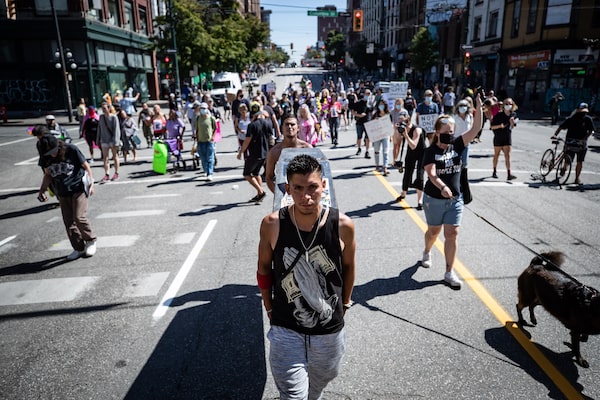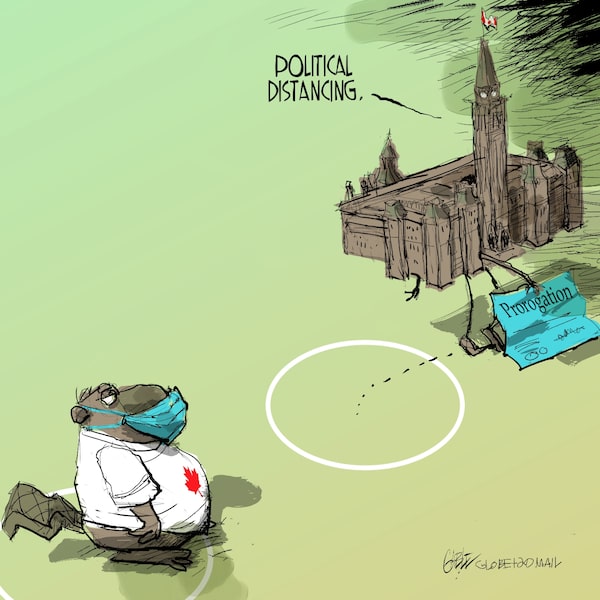Good morning,
A new directive from the federal prosecution service means that Canada is taking a step toward decriminalizing the possession of illegal drugs. The Public Prosecution Service of Canada announced this week that prosecution is now only permitted in the most serious cases, meaning those that put public safety, and especially children, at risk.
The prosecution service has some discretion in how it chooses to follow crime legislation, but the move is being seen as a step forward in viewing substance-use disorders as a health issue. The directive advises finding alternatives to prosecution, such as treatment or restorative justice programs.
The change comes as deaths from opioid overdoses continue to soar across the country. In British Columbia alone, 728 people died within the first six months of the year, compared with 198 deaths from COVID-19.

Two men carry a coffin during a memorial march to remember victims of overdose deaths in Vancouver on Saturday, August 15, 2020. The B.C. Coroners Service reported a record number of 175 overdose deaths related to illicit drugs in June. Approximately 5,000 people have died from illicit-drug overdoses since a public health emergency was declared in 2016.DARRYL DYCK/The Canadian Press
This is the daily Morning Update newsletter. If you’re reading this on the web, or it was forwarded to you from someone else, you can sign up for Morning Update and more than 20 more Globe newsletters on our newsletter signup age.
Morneau urged Trudeau to rein in senior PMO staff prior to resignation
Bill Morneau resigned as Finance Minister on Monday after failing to persuade Prime Minister Justin Trudeau to stop top officials from leaking negative stories about him.
This is according to an account by a senior government official close to Morneau. According to this official, during a meeting between the two men at Trudeau’s home, the Prime Minister did not ask his finance minister to stay in the job. This ultimately led to Morneau submitting his resignation during the meeting.
There were repeated disagreements between the PMO and the minister’s office throughout the pandemic over the size of emergency measures and their policy rationale.
Read more on Morneau:
Canada should rethink aid to Mali after two coups, analysts say
A military coup on Mali, the second one in eight years, has raised questions about Canada’s extensive financial and security support for the West African country’s dysfunctional government.
Soldiers detained president Ibrahim Boubacar Keïta in an apparent coup on Tuesday, which led to his resignation hours later. In Mali’s capital, Bamako, the news was greeted with jubilation in the streets, signalling that the government had lost the people’s support.
Canada has given Mali nearly $1.6-billion in development aid over the past 20 years, making it one of Mali’s biggest foreign supporters. However, some experts in Canada say that this aid, rather than helping to end violent conflict in the country, has only allowed Mali’s government to stall on political reforms.
Got a news tip that you’d like us to look into? E-mail us at tips@globeandmail.com Need to share documents securely? Reach out via SecureDrop
ALSO ON OUR RADAR
Five key takeaways from the Democratic National Convention’s third night: Kamala Harris accepted a historic nomination as the first Black and South Asian woman to be running on the presidential ticket. The night was a celebration of women’s achievements, with speakers including Hillary Clinton and Elizabeth Warren.
Hundreds of Belarussian protesters defy new order from Lukashenko: Despite an order from the embattled President to clear the streets of Minsk, hundreds of Belarussians continued to protest Alexander Lukashenko’s re-election. The European Union held an emergency summit to dispute Lukashenko’s rule and announced sanctions against some officials.
RCMP investigating cyberattack at RMC: The RCMP is investigating a cyberattack at the Royal Military College that involved the leak of soldiers’ personal data. The attack was first reported by The Globe in early July, and experts say it is an indication of the increasing danger of “ransomware.”
The 1,400 hectare Christie Mountain wildfire encroaches on the neighbourhood of Heritage Hills between Penticton and Okanagan Falls above Skaha Lake as helicopters douse the flames with lake water Wednesday morning.Lucas Oleniuk/The Globe and Mail
B.C. wildfires force hundreds to evacuate: At least one home has been burned in wildfires ravaging B.C’s Okanagan region. Hundreds of people have been evacuated and thousands more are on alert to be ready to leave quickly.
Read more on wildfires:
TDSB considers directing money into high-risk areas: The Toronto District School Board will finalize its back-to-school plan for elementary students this week. On the table are proposals to direct money to high-risk areas to hire more teachers and shrink class sizes. However, this means other parts of the city might not have the same options.
Read more on back-to-school:
- Laurentian University suspends admissions to 17 programs including business, music
- B.C. Teachers Federation wants smaller class sizes, stricter mask policies in back-to-school plan
MORNING MARKETS
Global stocks fall as markets still rattled by Fed meeting minutes: Asian and European share markets fell on Thursday, after the U.S. Federal Reserve’s latest meeting minutes highlighted doubts about the recovery of the world’s largest economy and knocked Wall Street from recent record highs. Just before 6 a.m. ET, Britain’s FTSE 100 was down 1.27%. Germany’s DAX and France’s CAC 40 fell 1.28% and 1.48%, respectively. In Asia, Japan’s Nikkei slid 1.00%. New York futures were weaker. The Canadian dollar was trading at 75.67 US cents.
WHAT EVERYONE’S TALKING ABOUT
It’s clear as ice: The Arctic is unravelling
Glenn McGillivray: “We can say with strong confidence that loss of sea ice at the North Pole is beginning to affect the weather where large numbers of people reside. So we must understand, the Arctic is not the canary in the coal mine – it is the coal mine.”
The Democrats appeal to America’s soul
Lawrence Martin: “The Democrats’ show is coming across like an infomercial. Many awkward, canned and cheesy moments have marred the first two nights of their online convention. But there were enough pieces of emotional force, thanks mainly to the stirring presentations by Jill Biden and Michelle Obama, who has emerged as the conscience of the party, to overcome the dross.”
Justin Trudeau’s cynical disdain for Parliament, and for Canadian voters
The Editorial Board: “It’s now safe to say that Justin Trudeau has arrived as a Canadian prime minister. The callow scion deemed ‘just not ready’ by the Conservatives in 2015, and who promised to do politics differently, has officially completed his transformation into a leader who is ruthless, cynical and disdainful of Parliament.”
TODAY’S EDITORIAL CARTOON

cartoonBrian Gable/The Globe and Mail
LIVING BETTER
Gordon Lightfoot’s booking agent Bernie Fiedler can’t get a date
With the live music industry more or less shut down these days, you would think a semi-retired booking agent who only has one client wouldn’t have much to do. You would be wrong, though. Bernie Fiedler, who has been handling concert arrangements for Gordon Lightfoot for longer than they’ve been putting men on the moon, is busier than he’d rather be.
MOMENT IN TIME: August 20, 1920

The Salzburg Festival began with Hugo von Hofmannsthal’s morality play, Jedermann, with Alexander Moissi in the title role. Four performances were scheduled, followed by two others set aside exclusively for the people of Salzburg, August 22-26, 1920. Hugo von Hofmannsthal's Jedermann in Max Reinhardt's 1920 production. Alexander Moissi (Jedermann), Johanna Terwin (Paramour) and Werner Krauss (Death).Salzburg Festival Archive
Salzburg music festival begins
One hundred years ago today, theatre director Max Reinhardt and poet and librettist Hugo von Hofmannsthal, who were both Austrian Jews, helped found a festival in Mozart’s birthplace seeking to restore pride in the music and art of their homeland after the humiliation of the First World War. From the very beginning, the festival was a success. However, by 1938, Austria had enthusiastically embraced Nazi Germany and Jews were no longer welcome at Salzburg, though Hitler preferred the Wagner festival at Bayreuth. After the war, under the baton of Herbert von Karajan – the less said about his ties to the Nazis, the better – Salzburg became the world’s leading festival of classical concerts and opera. Theatre is now prominent as well. Even coronavirus can’t keep the festival down: a shortened season with mandatory masks, half-full theatres and no intermissions is underway for those who can afford a ticket. (Tickets are $695 for a top-price seat at the Aug. 18 performance of Mozart’s Così fan tutte, according to the festival’s website.) Travel restrictions mean there will be no visitors from America this year. John Ibbitson
If you’d like to receive this newsletter by e-mail every weekday morning, go here to sign up. If you have any feedback, send us a note.